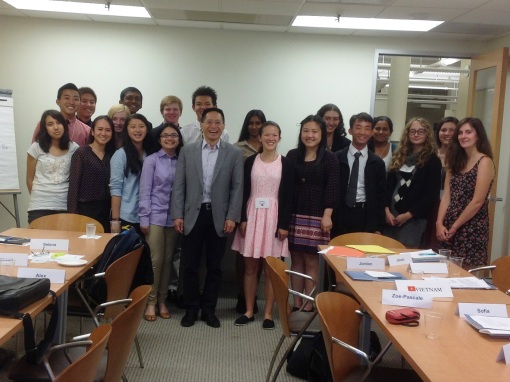
Eric Liu
Professor Eric Liu came to speak with the Summer Institute on a myriad of subjects. Given his extensive knowledge in many areas, the students took advantage and asked him questions on immigration, civic knowledge, income inequality and a host of other subjects. He answered each question that came at him with enthusiasm and clarity. His responses and general outlook also resonated with the SI students as many found themselves reflecting on their own experiences after the program. Nava appreciated his ability to see the potential for great things in the US, while still acknowledging its flaws and room for growth. She wrote, “It is so easy to say, ‘The world is messed up and there’s nothing I can do about it.’ It’s so much harder to say, ‘The world is messed up and I’m not comfortable leaving it that way.’ This way of thinking was at the core of Eric Liu’s message. He challenged the students to become more active participants in their communities.
Professor Liu is the founder of Citizen University, a program dedicated to cultivating civic knowledge and participation. As the number of schools requiring civics courses have diminished, so too has civic knowledge. He made the rather sad assertion that more people in the US can name a judge on American Idol than a Supreme Court Justice. Professor Liu dedicates much of his writing, teaching and speaking to reinvigorating civic responsibility in communities. If one is to be a good citizen, one must know the rights and responsibilities of citizenship. It also means being active in the political process and holding one’s own government responsible. As Selena stated:
Being American means being patriotic to the country. However, being patriotic does not mean you agree with everything the country does whether it is right or wrong. Being patriotic means, “when right to be kept right, when wrong to be set right”Professor Liu also touched on the great boon that immigration has been to the US. It has broadened the world-views of its citizens and led to a creative melding of cultures and ideologies. In order for this to flourish, Professor Liu believes the US should welcome immigrants with open arms, not turn them away. In his reflection on the SI meeting, Jensen wrote, “When more and more cultures meet and intertwine together, the ‘chemical solution’ gets more dilute. Tough it may seem like a bad thing at first, it’s to the United States’ advantage because new and innovative ideas emerge from that pool of solution.” As professor Liu stated in his program, this dilution of cultures is a “beautiful tragedy;” although a third generation Korean American may not be able to prepare kimchi the way their grandparents could, and a second generation Latino American may not be able to cook the foods of their ancestors, kimchi burritos now exist and they are wonderful.
I encourage you to test your own civic knowledge by taking an online practice exam for US citizenship. While a good many of the questions may be familiar to you, some showed me that I need to brush up on civics myself. You can take practice tests at 4test.org or at UCIS.gov.
By Samir Belkacem, Education Program Intern, World Affairs Council
In case you missed Professor Liu’s talk, you can listen to it on the Council website.

